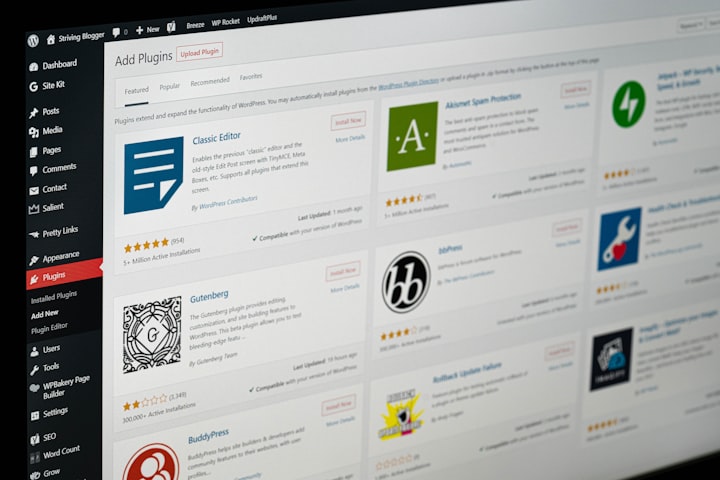Why I Started Using Ghost Instead of WordPress to Launch My Blog

(This post was commissioned to a writer on Upwork and is not edited).
All bloggers would have a history with Google’s Blogspot and WordPress.
Blogposts did not reach the peak of blogging. WordPress emerged to be the most resilient and innovative when it came to providing that ideal platform for bloggers to share their travel adventures, unending DIYs and home improvements, and make-up hauls, tutorials, and reviews.
All possible content that can be shared on the internet- could be blogged using WordPress.
The Choice
Back then, it was a no-brainer for me when I was planning for the grand launch of my blog. Like many bloggers before me, I was loyal to WordPress, but things took a drastic turn when I encountered Ghost.
It became apparent that WordPress would have to be pushed back to the corner, and Ghost would have the pleasure of launching my simple blogging site.
The decision was faced with weighing the two platforms and doing a comparative study that suits me best and which blogging site would meet my needs.
With WordPress being the go-to blogging beast, it was challenging to steer clear from a platform that had proven to be reliable all these years. It's like going against a norm, and the idea is both exciting and scary.
For those blogging newbies, here is a quick glance at WordPress and Ghost.
WordPress
This popular blogging platform was launched in 2003 by Matt Mullenweg. WordPress is a free and open-source PHP-blogging platform, and it comes in two variants: WordPress.com and self-hosted WordPress.
What started as a purely blogging site expanded and became more than just a place for blogging. Today, many still use WordPress to publish content, but more are taking advantage of using it as landing pages, forums, e-commerce or corporate websites, company intranets, and event microsites.
Over the years, WordPress has been witness to an individual's life and the success and growth of companies.
Ghost
A decade younger than WordPress, this platform which is highly dubbed as the "simple but modern WordPress alternative," was launched in 2013. This endeavor was led by John O’Nolan, an ex-WordPress employee.
During the launch, Ghost was described the same way as WordPress, which is "just a blogging platform." The similarities are epic.
It is also an open-source and free platform built on NodeJS and simulates WordPress flavors of self-hosted and hosted choices. One noticeable advantage is with the hosted version of Ghost, the restrictions are not as rigid as WordPress.
With a mini meet and greet with these two blogging platforms, let’s find out what influenced my decision to forego WordPress and go for a new logo.
WordPress vs Ghost: A Study in Comparison

For starters, both blogging platforms are free to download and are open-source. This means that you can use the site however you want it. You can even monetize it without any restrictions.
These two reasons alone are winning features for any blogger who has a good understanding of coding. Technically, even those with zero programming knowledge will find these two as a popular solution. Small to medium scale businesses also find these a huge plus because it gives their internal content publishers a user-friendly and pleasant interface that can be used for promotions, sales, and marketing.
Both WordPress and Ghost have the core features that any blogger can wish for. However, this doesn’t mean that these two platforms are alike in all aspects.
Here are some of the reasons why I gave Ghost a huge thumbs-up.
Overall Blogging
Yes, they are both intended for blogging. But their approach to blogging is different.
The most significant variance would be in Ghost; I was using Markdown, a shorthand version of HTML, while in WordPress, it was the friendlier WYSIWYG editor that I was working with.
Markdown might cause some eyebrows to go up, especially to those avid fans of WYSIWYG editors. Still, eventually, I found that after I got comfortable using Markdown that its time-saving shortcuts are something that all bloggers should know and use.
The overall interface of Ghost is clean and straightforward.
WordPress would be the preferred blogging platform of choice if I could toggle confidently between HTML and WYSIWYG. Advanced users can have a large playground making changes in the blog that the WYSIWYG editor can't achieve. Unfortunately, my programming skills are only average.
Despite WordPress not having the prettiest interface, it does have its advantage over plugins which can boost its power and functionality. I even tried to install a Markdown plugin in WordPress to feel how Ghost worked when I was deciding which platform to use.
But to make the most out of WordPress, I realized that I needed to have a handful of plugins.
For every function, a particular plugin is required. Else I end up struggling with some of the actions that I want to achieve. An example would be the Yoast SEO plugin, so without it, I am unable to configure my posts suitable for search engines.
With Ghost, it already has integrated SEO features, including mega tags and meta descriptions. No plugins are required.
Social Sharing Options
Both WordPress and Ghost will publish my content in my blog.
The only way I can share it on my social media is by sharing that particular content's link.
For WordPress, it's very dependent on plugins. I had to look for a plugin that can automate my social sharing feature. If there are updates in WordPress or my theme, I need to re-download the plugin and even look for another one compatible with my current settings.
Ghost gave me zero-hassle experience in sharing my content because it has a built-in social share button that was automatically available on all my published posts. Regardless of a new update, it stays there, and I don't need to do anything from my end.
Speed and Performance
One of the other reasons I started leaning towards Ghost is the overall performance and responsiveness of the platform.
Ghost is driven by a newer technology stack that's using Node.js, and this is really, really fast. You will be impressed with how fast Ghost works.
There were tests done, and the results show that Ghost is up to 1,900% faster than the older WordPress. This means in the time that it takes for WordPress to react to a single request, Ghost would have been done with 19 of these already.
I realized that the speed of my blog plays a critical role when it comes to my ranking and especially to the mobile user engagement, so every single second counts. I don't have to worry about the pace with Ghost.
Price Affordability
I was able to download both for free. I was also able to host through a web host for less than $5 per month.
There would be a difference between pricing Ghost Pro vs. Wordpress.com. These two are the cloud-hosted choices of the two platforms.
WordPress.com provides a free plan, but unfortunately, there are too many restrictions. The WordPress ads on my content didn't work well for me. I wanted my readers and visitors to take me seriously, and the ads alone destroyed that image.
Ghost also provides a free plan with lesser constraints and zero ads which I love. The catch here is this free cloud hosting is only for two weeks which I refer to as my trial phase.
On the other hand, the business usage account comes for $130 dollars, billed yearly. The same plan for Ghost comes at $199 dollars per year, but with more benefits.
After 14 days, I had to pay $19 per month to keep it that way. It was a fair deal for me because I got to experience what it's like without shelling any money, and not having ads alone is a sure winner for me.
When I availed myself of the Ghost Pro, I experienced no limitations. I've tried uploading my themes and content, and Ghost just let me be.
My Verdict
I am now a Ghost convert, and I am happy that I used Ghost to launch my blog instead of WordPress.
Ghost had me convinced that it is the best platform for blogging and publishing. WordPress, on the other hand, is better suited for a complex and more dynamic website.
I like how Ghost is for those like me, who are searching for a no-nonsense blogging tool that can let me publish my posts, format them the way I like them, and share them on my social media.
This is an excellent pick for me because it works without further configuration or tweaks.
With my programming and technical skills, it took me a while to learn and master them, and after that, it was a breeze.
Summing It Up
I am impressed with Ghost’s speed and happy with its performance. I appreciate the simplicity of its well-designed user interface because seeing so many icons and functions can be overwhelming.
In the future, there might be newer ideas that would be integrated into this blogging platform, and I'll be more than willing to give them a try.
If you’re thinking of starting a blog, give Ghost a try.




Comments ()